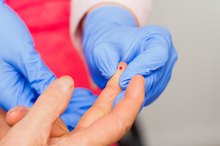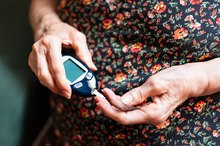How Does an Infection Increase Blood Sugar in Diabetics?
When a person has diabetes, infection is cause for concern. Even everyday infections such as the common cold can cause blood glucose levels to increase. Infection is a challenge that requires careful blood glucose monitoring and proper medical care.
Process
When struck by infection, the body releases stress hormones that help it fight the infection but at the same time cause an increase in blood glucose. Insulin resistance also increases, causing a further rise in glucose levels by impairing the body's ability to use glucose for energy.
Treatment
Can Infection Raise Blood Sugar Levels in Nondiabetics?
Learn More
Doctors and diabetes educators recommend having a sick-day plan for managing common infections at home. Part of a sick-day plan is knowing how often you should test your blood glucose when you're not feeling well. Ask you doctor if you also need to test your urine for ketones when you're sick. Staying hydrated is important since dehydration can occur when blood glucose levels are too high. A sick-day plan includes knowing when to call your doctor or seek emergency treatment, as well as how to maintain your usual carbohydrate intake when you don't feel like eating your normal foods. If you use insulin, work with your health-care team to make a plan for adjusting dosage to control elevated blood glucose levels.
- Doctors and diabetes educators recommend having a sick-day plan for managing common infections at home.
- A sick-day plan includes knowing when to call your doctor or seek emergency treatment, as well as how to maintain your usual carbohydrate intake when you don't feel like eating your normal foods.
Prevention
Some studies indicate that people with diabetes are at higher risk for certain types of infection, such as urinary tract infections and yeast infections. Existing high blood glucose levels in the body create an environment where certain micro-organisms can thrive. In addition, diabetes can cause a person to get sick when she gets an infection, such as the flu or pneumonia. For this reason, the U.S. Centers for Disease Control recommend that people with diabetes be vaccinated for influenza, pneumococcal pneumonia and tetanus/diphtheria 5.
- Some studies indicate that people with diabetes are at higher risk for certain types of infection, such as urinary tract infections and yeast infections.
Learning More
What Causes Fever in People With Diabetes?
Learn More
Your health-care team can help you learn about the signs and symptoms of infection and to make a sick-day plan. Always consult your doctor if you suspect an infection and for advice on how to take care of it. Your doctor may recommend a visit with a diabetes educator, who can help you learn about ways to manage your diabetes and make a plan for managing special situations.
Related Articles
References
- Journal of Endocrinology and Metabolism: Severity, Duration and Mechanisms of Insulin Resistance During Acute Infections
- PubMed: Influence of Diabetes on Endothelial Cell Response During Sepsis
- American Diabetes Association. 5. Lifestyle management: Standards of medical care in diabetes-2019. Diabetes Care. 2019;42(Suppl 1):S46-60. doi:10.2337/dc19-S005
- National Institute of Diabetes and Digestive and Kidney Diseases. Diabetes diet, eating, & physical activity. Published December 2016.
- American Diabetes Association. The big picture: Checking your blood glucose.
- American Diabetes Association. 6. Glycemic Targets: Standards of Medical Care in Diabetes-2020. Diabetes Care. 2020;43(Suppl 1):S66-S76. doi:10.2337/dc20-S006
- American Diabetes Association. 14. Management of diabetes in pregnancy: Standards of medical care in diabetes-2020. Diabetes Care. 2020;43(Suppl 1):S183-S192. doi:10.2337/dc20-S014
- Porcellati F, Lucidi P, Bolli GB, Fanelli CG. Thirty years of research on the dawn phenomenon: Lessons to optimize blood glucose control in diabetes. Diabetes Care. 2013;36(12):3860-2. doi:10.2337/dc13-2088
- American Diabetes Association. 5. Lifestyle management: Standards of medical care in diabetes-2019. Diabetes Care. 2019;42(Suppl 1):S46-60. doi:10.2337/dc19-S005
- Colberg SR, Sigal RJ, Yardley JE, et al. Physical activity/exercise and diabetes: A position statement of the American diabetes association. Diabetes Care. 2016;39(11):2065-2079. doi:10.2337/dc16-1728
- American Diabetes Association (ADA). Understanding A1C.
- Garber AJ, Abrahamson MJ, Barzilay JI, et al. Consensus statement by the American association of clinical endocrinologists and American college of endocrinology on the comprehensive type 2 diabetes management algorithm - 2019 executive summary. Endocr Pract. 2019;25(1):69-100. doi:10.4158/CS-2018-0535
Resources
Writer Bio
Kathy Dropeski began writing for various websites since 2010. She has been published in the American Association of Diabetes Educator's "AADE in Practice" and has produced numerous patient teaching materials and local news articles. Dropeski obtained her bachelor's degree in nursing from Concordia University. She has been a registered nurse since 1995 and a certified diabetes educator since 2005.









